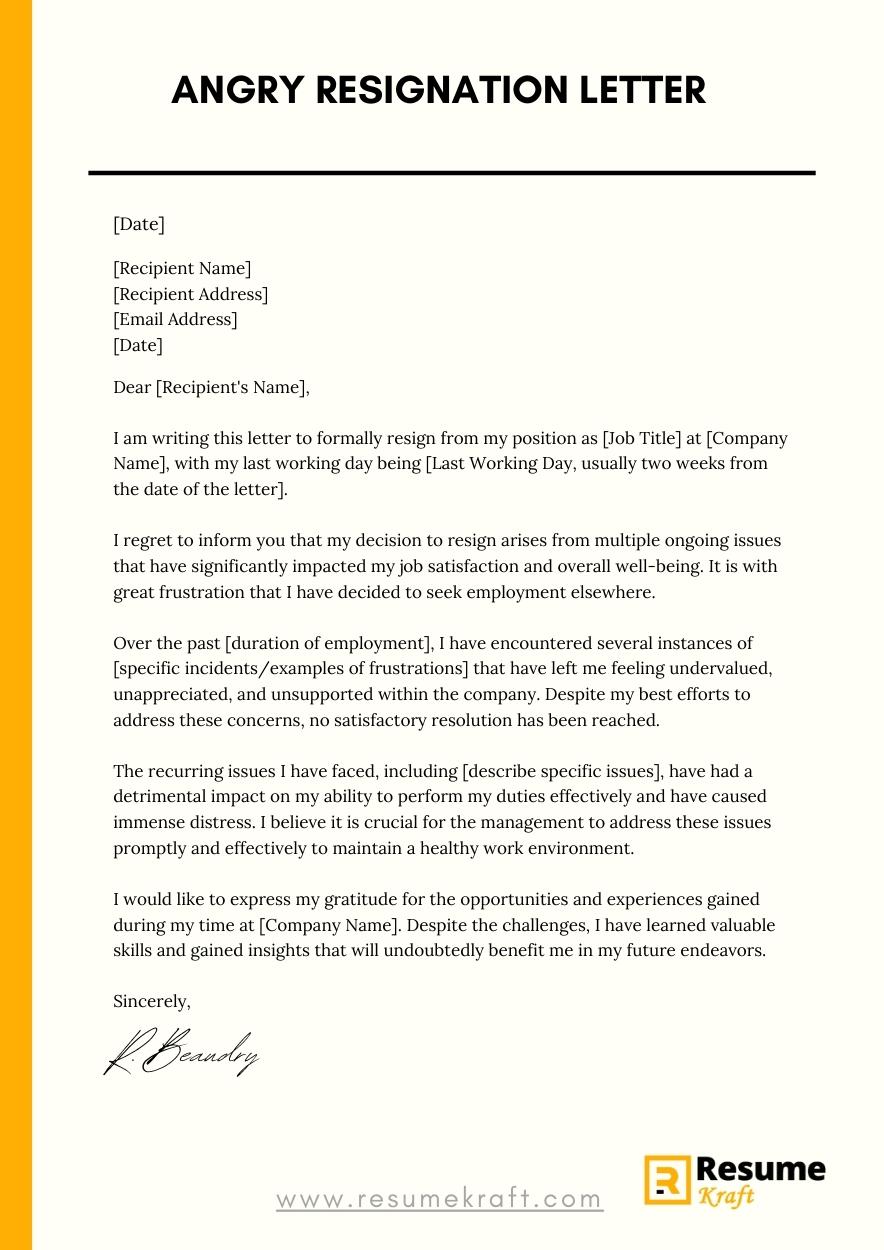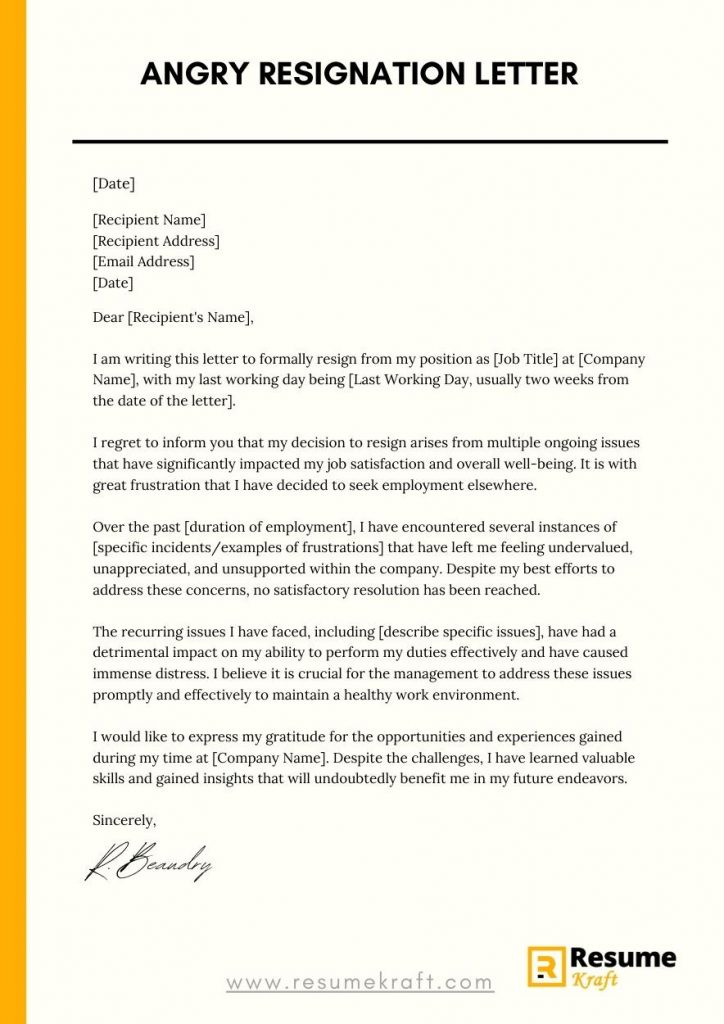
An angry resignation letter can be a powerful tool for expressing your frustrations and concerns before leaving a job. However, it’s important to approach this situation with professionalism and tact. In this article, we will guide you through the process of writing an angry resignation letter, providing tips, examples, and a step-by-step guide to help you communicate effectively while maintaining your dignity.
What To Include in an Angry Resignation Letter
When writing an angry resignation letter, it’s crucial to keep in mind the goal of expressing your frustrations constructively. Here are some key elements to include in your letter:
- Clear statement of resignation: Begin your letter by clearly stating that you are resigning from your position and providing the expected last day of work.
- Reasons for your anger: Explain the specific reasons why you are feeling angry or frustrated. Be honest but avoid personal attacks or disrespectful language.
- Factual examples: Back up your claims with concrete examples or incidents that support your frustration. This helps provide clarity and validity to your concerns.
- Impact on your decision: Explain how the issues you faced have affected your job satisfaction, work performance, or overall well-being. Express the impact it had on your decision to resign.
- Request for resolution: If you believe there is a chance for resolution or improvement, express your desire for management to address these issues to prevent them from affecting future employees.
- Gratitude: Despite your frustration, it’s important to express gratitude for any opportunities or experiences gained during your time with the company. This helps maintain a professional tone.
- Professional tone: While it’s natural to feel angry, it’s important to maintain a professional and respectful tone throughout the letter. Avoid offensive or derogatory language.
What Not to Include in Your Angry Resignation Letter
When writing an angry resignation letter, it’s essential to avoid certain elements that could undermine your message and professionalism. Here are some things to avoid:
- Personal attacks: Do not engage in personal attacks or insults towards colleagues or the company. Focus on the facts and your own experiences.
- Excessive emotion: While it’s important to express your frustrations, avoid excessive emotional language that may weaken your argument or come across as unprofessional.
- Threats or ultimatums: Avoid making threats or ultimatums in your letter. Instead, focus on expressing your concerns and desires for resolution.
- Gloating or negativity: Refrain from expressing joy or gloating about leaving the company. Maintain a respectful and mature tone.
- Lengthy explanations: Keep your letter concise and to the point. A lengthy and overly detailed letter may lose impact and come across as rambling.
How To Format an Angry Resignation Letter
To ensure your angry resignation letter is well-structured and professional, follow these formatting guidelines:
- Header: Include your name, job title, and contact information at the top of the letter.
- Date: Add the date below your contact information.
- Recipient: Address the letter to your supervisor or the appropriate person within the organization.
- Subject line: Add a clear subject line, such as “Resignation Letter – [Your Name].”
- Introduction: Start with a formal salutation, a brief introduction, and a clear statement of your resignation.
- Body paragraphs: Use paragraphs to address each issue separately, providing examples and expressing your frustrations.
- Conclusion: Wrap up the letter by expressing gratitude, acknowledging any positive experiences, and reiterating your desire for resolution.
- Closing: End the letter with a professional closing, such as “Sincerely” or “Best regards,” followed by your name and signature.
Angry Resignation Letter Samples

Example 1 – Printed Resignation Letter Sample
[Your Name]
[Your Job Title]
[Company Name]
[Company Address]
[City, State, ZIP]
[Email Address]
[Phone Number]
[Date]
[Recipient’s Name]
[Recipient’s Job Title]
[Company Name]
[Company Address]
[City, State, ZIP]
Subject: Resignation Letter – [Your Name]
Dear [Recipient’s Name],
I am writing this letter to formally resign from my position as [Job Title] at [Company Name], with my last working day being [Last Working Day, usually two weeks from the date of the letter].
I regret to inform you that my decision to resign arises from multiple ongoing issues that have significantly impacted my job satisfaction and overall well-being. It is with great frustration that I have decided to seek employment elsewhere.
Over the past [duration of employment], I have encountered several instances of [specific incidents/examples of frustrations] that have left me feeling undervalued, unappreciated, and unsupported within the company. Despite my best efforts to address these concerns, no satisfactory resolution has been reached.
The recurring issues I have faced, including [describe specific issues], have had a detrimental impact on my ability to perform my duties effectively and have caused immense distress. I believe it is crucial for the management to address these issues promptly and effectively to maintain a healthy work environment.
I would like to express my gratitude for the opportunities and experiences gained during my time at [Company Name]. Despite the challenges, I have learned valuable skills and gained insights that will undoubtedly benefit me in my future endeavors.
I sincerely hope that the management takes my concerns seriously and implements the necessary changes to prevent similar issues from affecting future employees. It is my belief that addressing these issues will contribute to a more positive and productive work culture.
Thank you for your understanding and consideration. I would be happy to assist in the transition process to ensure a smooth handover of my responsibilities. Please let me know how best to proceed.
Sincerely,
[Your Name]
Example 2 – Email Resignation Letter Example
Subject: Resignation – [Your Name]
Dear [Recipient’s Name],
I hope this email finds you well. I am writing to inform you of my decision to resign from my position as [Job Title] at [Company Name], effective after [Last Working Day, usually two weeks from the date of the email].
I have pondered this decision for some time and have concluded that it is in my best interest to pursue opportunities that align more closely with my goals and values. While I appreciate the experiences I have gained during my tenure at [Company Name], recent circumstances have left me deeply frustrated and dissatisfied.
I want to be transparent about the reasons behind my departure. Over the past [duration of employment], I have faced persistent challenges relating to [specific incidents/examples of frustrations]. These issues have had a significant impact on my motivation, performance, and overall job satisfaction. Despite my sincere efforts to seek resolution, these concerns have not been adequately addressed.
I genuinely believe that addressing these issues would benefit both current and future employees, as it would foster a healthier and more productive work environment. It is my hope that the management will take meaningful action to address these concerns promptly.
I would like to express my gratitude for the opportunities I have had to grow both personally and professionally during my time at [Company Name]. I value the relationships I have built with my colleagues and appreciate the knowledge and skills I have acquired. Despite recent challenges, these experiences have been invaluable.
Please let me know how I can assist with facilitating a smooth transition. I am committed to ensuring a seamless handover and will gladly provide any necessary documentation or support during this process.
Thank you for your understanding. I wish you and the team all the best for the future.
Sincerely,
[Your Name]
Key Takeaways
- Writing an angry resignation letter requires maintaining professionalism and expressing concerns constructively.
- Include a clear statement of resignation, reasons for your anger, factual examples, impact on your decision, request for resolution, gratitude, and a professional tone.
- Avoid personal attacks, excessive emotion, threats or ultimatums, gloating or negativity, and lengthy explanations.
- Format the letter with a proper header, date, recipient information, subject line, introduction, body paragraphs, conclusion, and a professional closing.
Frequently Asked Questions
1. Is it appropriate to write an angry resignation letter?
While it’s important to express your frustrations, it’s crucial to approach an angry resignation letter with professionalism and tact. Focus on specific incidents and avoid personal attacks or disrespectful language.
2. How can I maintain professionalism in an angry resignation letter?
To maintain professionalism in an angry resignation letter, focus on the facts, avoid personal attacks, back up your claims with examples, and express your desire for resolution. Keep the tone respectful and avoid excessive emotions or threats.
3. Should I send an angry resignation letter as an email or a printed letter?
The choice between an email or printed resignation letter depends on the company’s culture and your personal preference. Both can be effective if written professionally and respectfully. Choose the medium that aligns with the company’s communication norms.
4. Can an angry resignation letter negatively impact my future job prospects?
While an angry resignation letter can be cathartic, it’s important to consider the potential consequences. A negative letter could impact future job references or your professional reputation. Consider seeking advice from trusted mentors or colleagues before sending the letter.
5. What steps should I take after sending an angry resignation letter?
After sending an angry resignation letter, it’s important to maintain professionalism and tie up loose ends. Offer to assist with the transition process, ensure a smooth handover of responsibilities, and maintain a positive attitude during your remaining time at the company. It’s also advisable to reflect on the experience and consider any lessons learned for future job situations.
Conclusion
Writing an angry resignation letter can provide an opportunity to express your frustrations and concerns before leaving a job. By following the tips, examples, and step-by-step guide provided in this article, you can effectively communicate your emotions while maintaining professionalism and respect. Remember to focus on constructive feedback, provide concrete examples, and express your desire for resolution. With a well-crafted angry resignation letter, you can leave your job on your own terms while still upholding your dignity.

